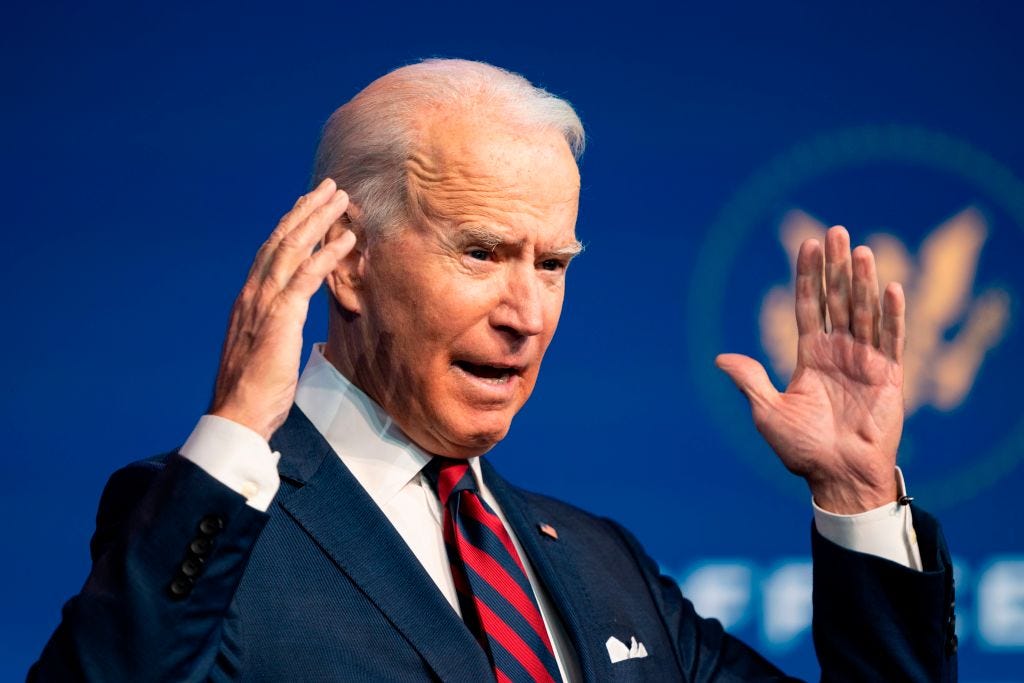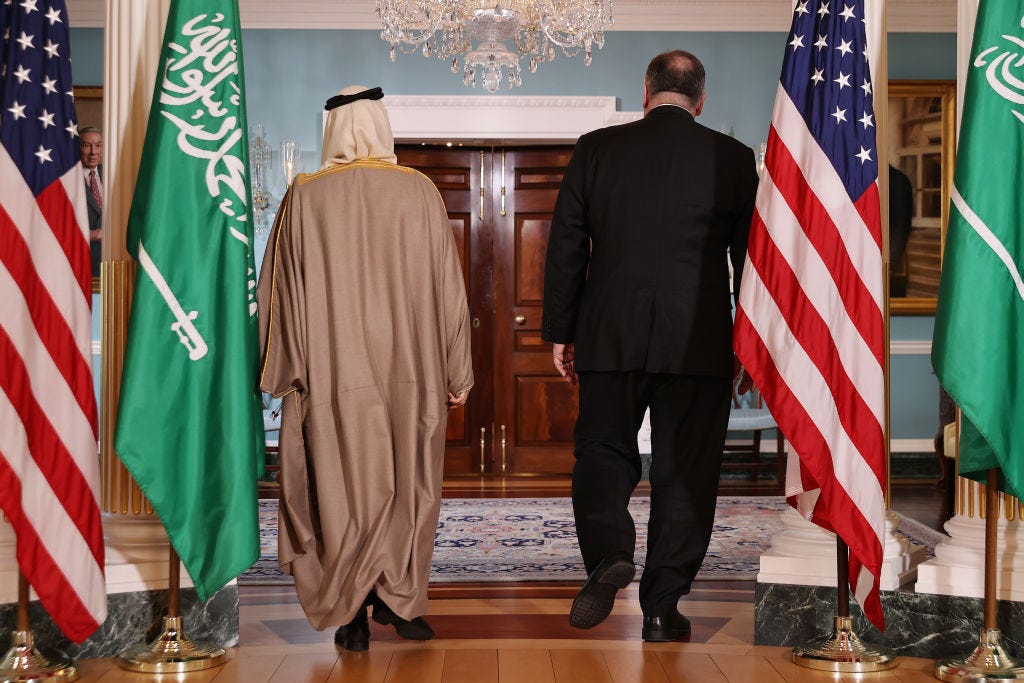Build back better (relations?)
US-Saudi ties in the post-Trump era
The Joe Biden campaign released a statement last October to mark the second anniversary of Saudi journalist Jamal Khashoggi’s killing:
Jamal Khashoggi and his loved ones deserve accountability. Under a Biden-Harris administration, we will reassess our relationship with the Kingdom, end U.S. support for Saudi Arabia’s war in Yemen, and make sure America does not check its values at the door to sell arms or buy oil. America’s commitment to democratic values and human rights will be a priority, even with our closest security partners. I will defend the right of activists, political dissidents, and journalists around the world to speak their minds freely without fear of persecution and violence. Jamal’s death will not be in vain, and we owe it to his memory to fight for a more just and free world.
That was a few weeks before he won the presidential elections against Donald Trump. Now that his win has been certified, the question is how does Biden plan to deliver on that promise, if at all.
Khashoggi’s fiancée on Friday urged Biden to release a classified report by the CIA that reportedly concluded with “medium to high confidence” that the assassination was ordered by Crown Prince Mohammed bin Salman. The crown prince has vehemently denied that but said he takes “full responsibility” as a leader because the crime that took place at the kingdom’s consulate in Istanbul in 2018 happened under his watch.
“The president-elect stands by what he said on the campaign trail regarding the murder of Jamal Khashoggi,” a source familiar with the transition and Biden’s thinking told the Guardian. “We know there remains work to do – including to provide the necessary transparency.”
The White House has sought to shield Saudi Arabia from any serious consequences after the murder, an indication of the close relationship that Prince Mohammed has cultivated with Trump who made the kingdom the destination of his first foreign trip after becoming president. The Washington Post reported earlier this year that senior lawmakers had asked the Office of the Director of National Intelligence to declassify information related to the killing.
The Post’s columnist Josh Rogin says the incoming Biden administration will get its first opportunity to show its commitment to his campaign trail promises when Congress holds its confirmation hearing of Avril Haines who was nominated for the position of director of national intelligence. Ron Wyden, a Democratic Senator from Oregon who has been vocal about the Khashoggi case, told Rogin that he plans ask Haines about releasing the report in the hearing.
All of this is raising the prospects for a rocky period in US-Saudi relations as Biden takes over. Saudi officials insist that the relationship is long and built on solid foundations, and that despite tensions over the years they have managed to maintain equally good ties with both Democratic and Republican presidents. “I’m confident that a Biden administration would continue to pursue policies that are in the interest of regional stability,” Saudi Foreign Minister Prince Faisal bin Farhan told Reuters last month. “Any discussions we will have with the future administration will lead to strong cooperation.”
Some observers say recent Saudi moves, including an anti-Muslim Brotherhood campaign, reveal the kingdom’s nervousness about Biden whose administration is likely to be filled by many veterans from the Obama era that the Saudis remember with very little fondness even though the US sold them $112 bn of weapons during his eight years in office and provided logistical support to the war in Yemen. When the Obama administration criticised Saudi Arabia, it was “usually expressed in quotes to the media by anonymous administration officials,” as Joshua Keating noted in Slate.
Biden has said during one of the Democratic debates that he would make Saudi Arabia pay the price for its actions and “make them in fact the pariah that they are.” The Saudis have dismissed these comments as part of the “silly season” that comes with every US election, and they firmly believe his tone would change after he returns to the White House.
The most detailed view of what to expect from the incoming Biden administration when it comes to relations with Saudi Arabia comes from an early 2019 interview on CBS with Antony Blinken, the next Secretary of State:
One, your new leader or de facto leader, the crown prince, acts in impulsive and sometimes reckless ways. We're not telling you who should lead your country. But we are telling you he needs to be reined in in some fashion. You choose how.
Second, this horrific war in Yemen that is doing extraordinary damage to tens of thousands, even hundreds of thousands, of innocent civilians, that needs to end. You need to actually take the first step in helping to end it. We're here to defend you. We will defend you from any aggression by the Houthis in Yemen. But you need to take steps to end this war. And we won't be complicit in it anymore.
Third, this crazy division with Qatar, that needs to end. You need to resolve it. And you also need to demonstrate to the world that the things you're talking about in terms of liberalizing your country you mean. And that means letting people who've been simply trying to advance and advocate for their rights out of jail.
Among all the issues he has raised, conversations on the Yemen war and the dispute with Qatar would probably be the easiest to find agreement. The Saudis want an exit, and they hope that last week’s formation of a new Yemeni government in the south would help to that end. As for the Gulf crisis, both Saudi Arabia and Qatar have sent positive signals recently, and we might see a preliminary deal when GCC leaders meet in Riyadh next month.
The rest is far more tricky.
The crown prince has demonstrated a strong ability to sideline rivals since he rose to power in 2015. If the kingdom’s most important Western ally is unwilling to keep him in check as we have seen during the Trump administration, it is hard to see who else would do that. When asked later in the interview if he thinks MBS was likely to change, Blinked said he was sceptical. “Which is why I think Saudi Arabia needs a governor on his impulsiveness and his recklessness of their choice -- whether it's a regent, whether it's a council, something,” he explained.
(Worth remembering the context and timing of these comments: after the Khashoggi murder, there were rumours that the king was considering appointing an elder royal to work as a senior adviser to the crown prince and ensure such grave mistakes are not repeated. That did not happen. Instead, the heir apparent’s younger brother Prince Khaled was brought back from his post as ambassador to the US and appointed as a deputy to MBS in the defence ministry.)
Even in moments of vulnerability, none of the crown prince’s critics inside the country, including members of the royal family and business elites, has dared to come out and question his authority in public. The Ritz-Carlton and subsequent crackdowns have practically neutered them.
This brings us to the last point about human rights. It is true that the Trump administration has been far less inclined to push Saudi Arabia on such issues publicly, but it is not as if previous administrations have managed to achieve much success with their efforts. Even in the rare cases where the outgoing administration has openly raised the plight of some individuals like Walid Fitaihi, it has had no results to show for it. He was sentenced to six years in prison on charges including “breaking allegiance with the ruler” by “sympathising” with a “terrorist organisation,” “offending other countries and their leaders,” and obtaining a “foreign [US] nationality” without prior permission.
The State Department says Pompeo “expressed concern for wrongfully detained U.S. citizens and human rights activists in the Kingdom and asked that the cases be resolved fairly and expeditiously” during a telephone call with Prince Faisal last week, as other detained dual US-Saudi citizens are expected to face trials in the coming days.
The notion that Saudi Arabia might consider releasing detained human rights activist as a goodwill gesture to the incoming Biden administration is far-fetched. Historically, the kingdom has been loath to appear pressured to move on such issues despite repeated calls from outside. Past American governments urged Saudi Arabia to lift the ban on women driving for many years; the kingdom did it only when they wanted.
History also suggests that hard, cold geopolitical interests almost always trump human rights concerns when it comes to US policy in the region. Saudi Arabia is unlikely to act on these concerns to placate the Biden team when they have other useful bargaining chips, including the perfect warming gift: normalisation with Israel.
After Saudi Arabia denied that Israeli Prime Minister Benjamin Netanyahu met with the crown prince in Neom last month, Natan Sachs and Tamara Cofman Wittes of the Brookings Institution wrote that a “Saudi opening to Israel could provide a short-term boost for the kingdom on Capitol Hill and in the media, but it wouldn’t address the underlying issues that have led both Democrats and Republicans to rethink the bilateral relationship.”
Nevertheless, that would be a good starting point as the Saudis brace themselves for the post-Trump era.
You can send your feedback by email to: alomran@hey.com or via Twitter: @ahmed


